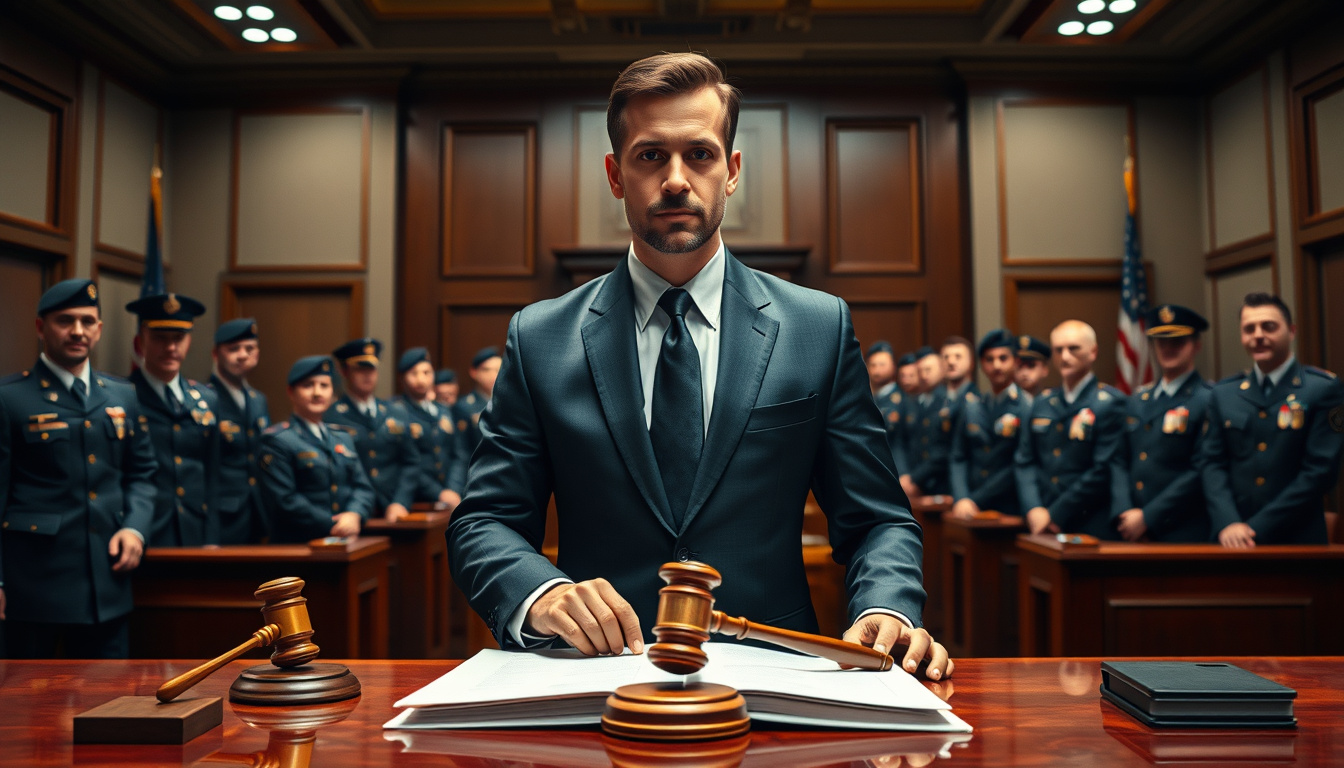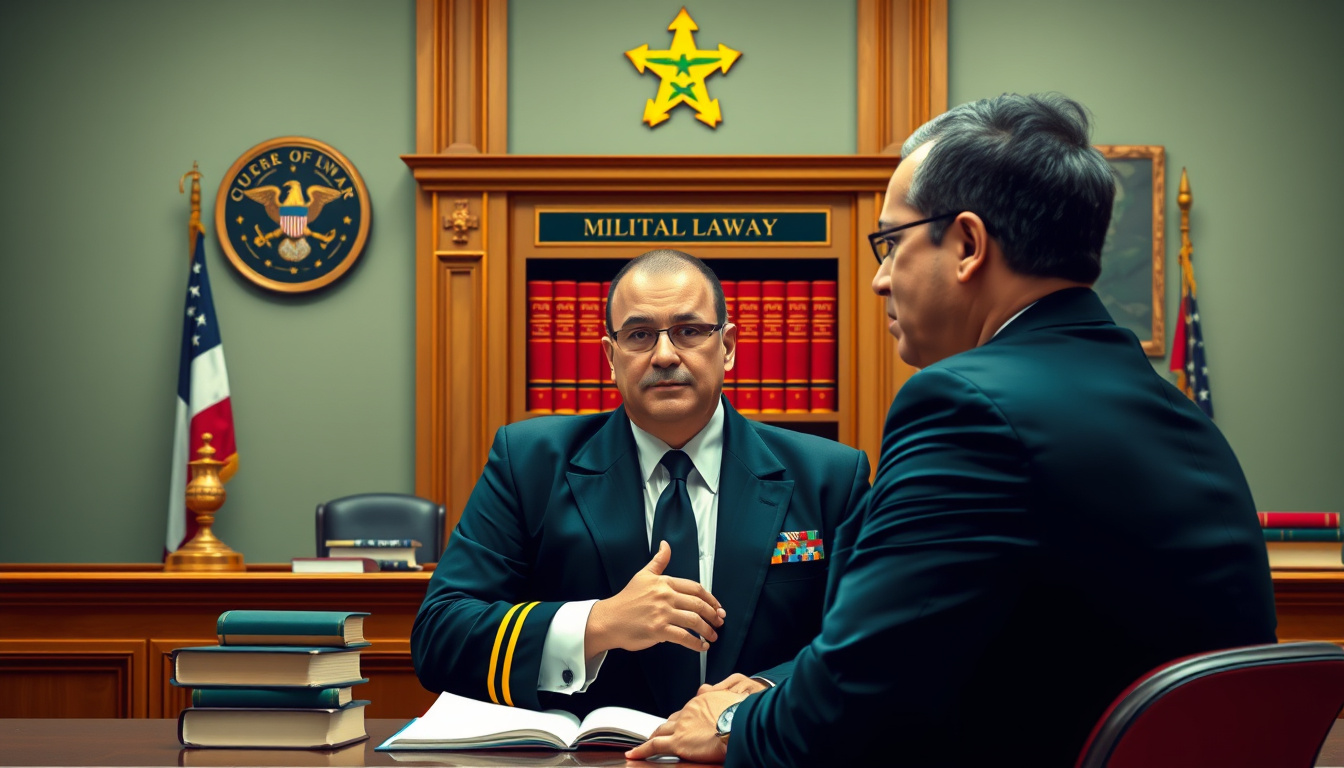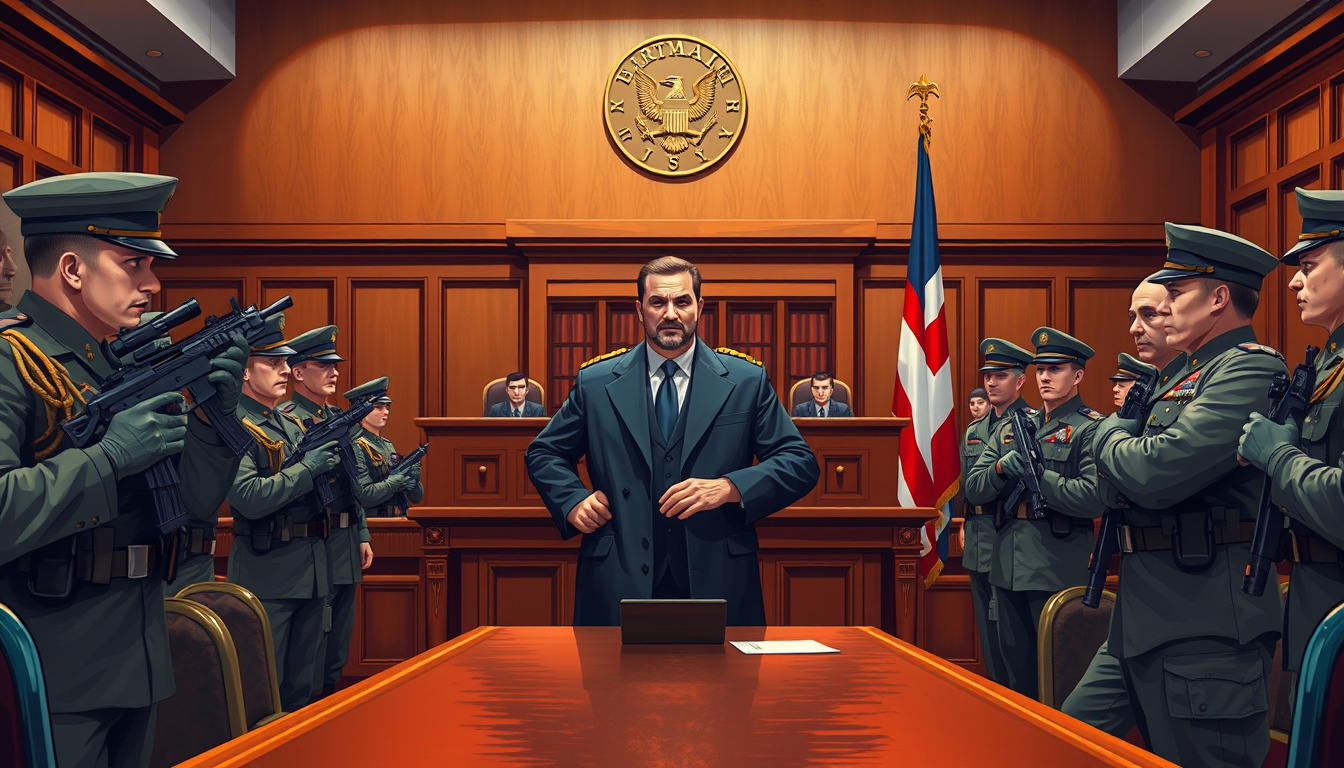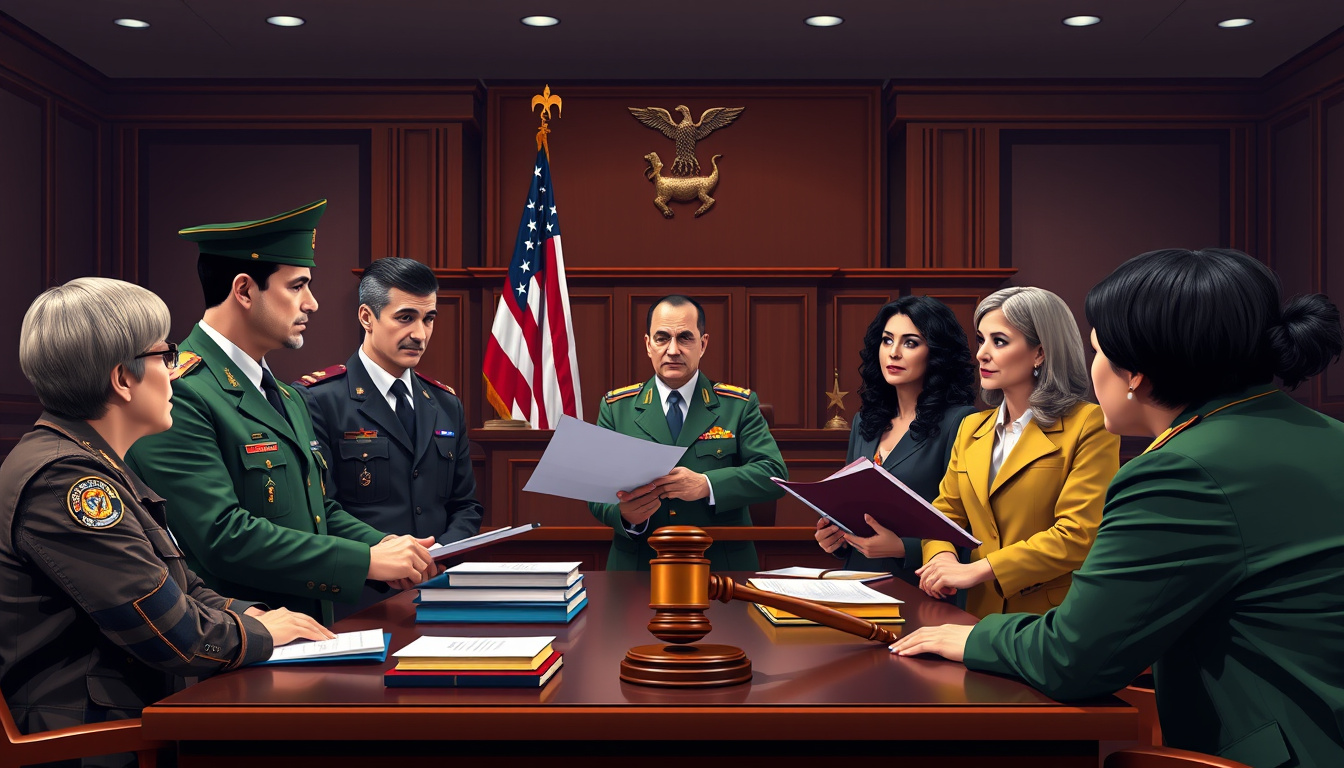When military servicemembers face legal challenges, the stakes can be incredibly high, especially in cases involving court martial, UCMJ violations, or administrative separations.
Navigating the complexities of military law requires specialized knowledge and experience.
That’s where the best court martial lawyer comes in.
This guide aims to empower military personnel and their families by explaining the court martial process, the importance of hiring a skilled lawyer, the qualities to look for, strategies for finding the right legal representation, and potential outcomes of court martial proceedings.
If you or a loved one are facing these serious allegations, understanding your rights and the legal landscape is crucial.

Key Takeaways
- A court martial is a military court designed to try members of the armed forces for offenses against military law.
- Hiring a specialized court martial lawyer can significantly impact the outcome of your case.
- Key qualities to seek in a court martial lawyer include experience, knowledge of military law, and strong communication skills.
- To find the best court martial lawyer, consider seeking referrals from trusted sources and reviewing their track record.
- Legal defense strategies can vary based on the unique circumstances of a case, and a skilled lawyer will tailor their approach accordingly.
Understanding Court Martial: Definition and Process
Facing a court martial can be an overwhelming experience, especially for military servicemembers and their families.
The best court martial lawyer will not only provide legal representation but will also guide you through the complex judicial process that is vastly different from civilian court proceedings.
A court martial is a military judicial process to adjudicate violations of the Uniform Code of Military Justice (UCMJ), which governs the behavior of all members of the armed forces.
Understanding the definition and process of a court martial can help alleviate some of the anxiety and uncertainty that accompany such serious allegations.
In essence, a court martial is a legal proceeding used to try military personnel for offenses that can include anything from minor infractions to felonies.
There are three types of courts martial: Summary, Special, and General.
A Summary Court Martial deals with minor offenses and is typically less formal, while a General Court Martial handles the most serious charges, akin to a felony trial in civilian settings.
The process begins with an investigation, followed by the decision to proceed with charges, which is locally considered as preferral of charges.
After charges are preferred, the accused has the right to consult with the best court martial lawyer to discuss their case, potential plea agreements, and the evidence that will be presented.
The next step typically includes an Article 32 preliminary hearing, resembling a civilian grand jury process, where evidence is evaluated to justify proceeding to trial.
The actual trial will involve a military judge and may also have a panel of jurors, which could consist of fellow servicemembers.
During the court martial, both the prosecution and defense will present their arguments, witness testimonies, and evidence.
This complex process requires a deep understanding of military law and the intricacies of the UCMJ, which is where having the best court martial lawyer becomes invaluable.
After the trial, the panel will decide on the verdict and any applicable punishment, which can range from a reprimand to confinement or even discharge from military service.
It’s important for servicemembers and their families to note that the outcomes of a court martial can significantly impact their military careers, personal lives, and futures.
Thus, seeking out experienced legal representation is essential for navigating this challenging process and ensuring that your rights are protected throughout.
The Importance of Hiring a Specialized Court Martial Lawyer
When faced with the daunting challenge of a court martial, UCMJ allegations, or administrative separation, the importance of hiring the best court martial lawyer cannot be overstated.
Military law is a complex field that differs significantly from civilian law, and having someone who specializes in military proceedings can greatly affect the outcome of your case.
Specialized court martial lawyers understand the intricacies of the Uniform Code of Military Justice (UCMJ) and the nuances of military regulations, which are crucial in crafting a solid defense strategy.
They are well-versed in the specific rights and protections available to servicemembers and can effectively navigate the legal system on your behalf.
Furthermore, the stakes are incredibly high when it comes to military justice, often involving severe disciplinary actions, potential loss of benefits, or unfavorable impacts on a servicemember’s career and future.
Therefore, investing time and effort into finding the best court martial lawyer not only ensures that you receive a comprehensive defense, but also provides peace of mind during an incredibly stressful period.
Engaging an experienced attorney who understands both the emotional and legal implications of military discipline can make a significant difference in your case’s outcome.
‘The law is reason, free from passion.’ – Aristotle

Qualities to Look for in a Court Martial Lawyer
When facing serious allegations within the military, having the best court martial lawyer on your side can significantly impact the outcome of your case.
It’s essential to choose a legal representative who not only possesses extensive knowledge of military law but also embodies certain qualities that enhance their effectiveness.
First and foremost, a deep understanding of the Uniform Code of Military Justice (UCMJ) is paramount; your lawyer should be well-versed in the specific rules, regulations, and procedures that govern military justice.
Additionally, having a background in military service can provide invaluable insights and enhance communication with members of the military court.
Empathy and emotional intelligence are also key factors in selecting the best court martial lawyer; facing a court martial can be an isolating experience, and you need a lawyer who understands the emotional toll this process can have on you and your family.
Furthermore, consider their track record and reputation within the military legal community.
A lawyer with a proven success rate and positive client testimonials will give you more confidence in their capabilities.
Lastly, a commitment to open communication is essential; your lawyer should be accessible and willing to answer your questions and discuss your case in detail, ensuring that you are informed and prepared for every step of the process.
By focusing on these qualities, you can select a lawyer who will best represent your interests during this challenging time.
How to Find the Best Court Martial Lawyer for Your Case
Finding the right representation when facing court martial proceedings can be one of the most crucial steps in ensuring a fair outcome.
You need an advocate who not only understands the intricacies of the Uniform Code of Military Justice (UCMJ) but also has a proven track record in handling military cases.
Here are some key steps to help you find the best court martial lawyer for your situation:
1.
Research and Recommendations: Start by asking for recommendations from fellow servicemembers or military support organizations.
They may have firsthand experience or know of reputable lawyers who specialize in military law.
Online reviews and testimonials can also provide insight into the lawyer’s reputation.
2.
Specialization in Military Law: Ensure that the attorney specializes in military law and is familiar with the court martial process.
They should have experience in dealing with cases similar to yours, including areas like UCMJ violations, administrative separation, and criminal allegations.
Their understanding of military protocol can be a significant asset.
3.
Experience with Court Martial Cases: Look for a lawyer who has substantial experience specifically in court martial cases.
This means they should have represented clients in trials, know court procedures well, and be able to navigate the complexities of military legal systems.
4.
Initial Consultation: Schedule initial consultations with potential lawyers.
This allows you to discuss your case and evaluate whether they are a good fit.
Pay attention to how they communicate, their willingness to answer your questions, and their overall demeanor.
The best court martial lawyer will take the time to explain the legal process and your options.
5.
Assess Their Success Rate: Inquire about the outcomes of cases they have previously handled.
A strong track record in achieving favorable outcomes for defendants can be a good indicator of their capabilities.
Don’t hesitate to ask them about similar cases they have worked on and the resolutions achieved.
6.
Understanding of Military Culture: The best court martial lawyer will have a deep understanding of military culture and the unique pressures and challenges that servicemembers face.
They should be able to relate to your experiences and provide tailored guidance that takes into account the military context of your situation.
7.
Transparent Fees and Costs: Discuss fees upfront and ensure you understand how the lawyer charges for their services.
Some may work on a flat-fee basis, while others might charge hourly.
Make sure there are no hidden costs and that you feel comfortable with the financial arrangement.
8.
Comfort and Trust: Finally, trust your instincts.
You should feel comfortable discussing sensitive information with your lawyer and confident in their ability to effectively represent your interests.
The best court martial lawyer will not only be an expert in their field but also a supportive ally during a challenging time.
In conclusion, taking the time to find the best court martial lawyer can make a significant difference in the outcome of your case.
By conducting thorough research, assessing their experience, and ensuring a personal fit, you can better navigate the complexities of military legal challenges and protect your rights.

The Role of a Court Martial Lawyer During the Trial
When navigating the complexities of a court martial, having the best court martial lawyer by your side can make all the difference in the outcome of your case.
These specialized attorneys play a critical role during the trial, providing invaluable support and expertise from the moment charges are filed.
Their primary responsibility is to protect your rights and ensure that you receive a fair trial, which is paramount in military legal proceedings.
A skilled court martial lawyer begins by meticulously analyzing the charges against you, identifying weaknesses in the prosecution’s case, and developing a robust defense strategy tailored to your specific situation.
They will engage in pre-trial motions, serve as your advocate during the trial, and present compelling arguments to challenge any evidence presented by the prosecution.
Beyond legal representation, the best court martial lawyer also provides emotional reassurance, helping military servicemembers and their families navigate the potentially overwhelming aspects of the legal process.
Their dedication and expertise can significantly affect the trial’s outcome, whether that means proving your innocence, negotiating lesser charges, or advocating for an honorable discharge instead of administrative separation.
Potential Outcomes of a Court Martial and Legal Defense Strategies
Facing a court martial is a daunting experience for any military servicemember or their families.
It’s crucial to understand the potential outcomes and the impact these can have on your military career and personal life.
The best court martial lawyer can provide invaluable support during this challenging time.
Court martials can lead to a range of outcomes, including acquittal, deferred sentencing, confinement, dishonorable discharge, or administrative separation.
An acquittal means the servicemember is found not guilty of the charges, leading to a return to duty without any repercussions.
On the other hand, a conviction could result in punishment ranging from loss of pay to imprisonment, depending on the severity of the offense.
Legal defense strategies are essential in navigating these proceedings.
Engaging the best court martial lawyer can significantly increase your chances of a favorable outcome.
A skilled attorney will investigate the case thoroughly, seeking evidence that supports the defense and potentially discredits the prosecution.
They may employ strategies such as challenging the admissibility of evidence, presenting witnesses who can testify on your behalf, or negotiating plea deals that could mitigate the consequences.
Understanding your rights under the Uniform Code of Military Justice (UCMJ) and the procedures of military courts is critical.
A competent lawyer will guide you through these complexities, ensuring you receive the best possible defense.

Frequently Asked Questions About Court Martial Lawyers
When facing serious allegations in the military, understanding your options is crucial.
One of the most important steps you can take is to seek out the best court martial lawyer.
These legal professionals specialize in military law and are equipped to guide servicemembers and their families through the complexities of court martial proceedings, UCMJ violations, and potential administrative actions.
If you have questions about what a court martial entails or how to choose the right lawyer for your case, you’re not alone.
Here are some frequently asked questions that many military personnel and their families have when navigating this challenging landscape.
1.
What is a court martial?
A court martial is a military court that conducts proceedings for members of the armed services who are accused of offenses under the Uniform Code of Military Justice (UCMJ).
Depending on the severity of the charges, there are different types of court martials, including summary, special, and general court martial.
2.
Why do I need the best court martial lawyer?
An experienced court martial lawyer can significantly impact the outcome of your case.
They possess specialized knowledge of military law, procedural rules, and the unique aspects of military justice.
This expertise can be critical in building a robust defense, especially when your career, reputation, and freedom are at stake.
3.
How do I find the best court martial lawyer?
Start by researching law firms that specialize in military defense.
Look for reviews and testimonials from previous clients, and seek recommendations from trusted sources, such as fellow servicemembers or legal assistance offices.
It’s essential to interview potential lawyers to assess their experience, approach to defense, and familiarity with the specific charges you’re facing.
4.
What should I expect during court martial proceedings?
Court martial proceedings can be complex and lengthy.
An experienced lawyer will walk you through every stage, from pre-trial motions to the trial itself, ensuring you understand each step.
You can expect to present evidence, examine witnesses, and make legal arguments as your lawyer advocates on your behalf.
5.
Can I appeal a court martial decision?
Yes, if you are convicted in a court martial, you have the right to appeal the decision.
An expert court martial lawyer can assist you with this process, guiding you through the necessary steps to file an appeal and challenging any legal errors that may have occurred during the trial.
In conclusion, facing court martial proceedings or UCMJ allegations can be daunting.
However, partnering with the best court martial lawyer can provide you with the best chance to navigate these challenges effectively.
As you seek to protect your rights, your career, and your future, make informed decisions about your legal representation.
Frequently Asked Questions
What is a court martial?
A court martial is a military court established to try members of the armed forces for offenses under military law.
It follows a legal process distinct from civilian courts, often involving different procedures and rules.
Why do I need a specialized court martial lawyer?
Hiring a specialized court martial lawyer ensures that you have legal representation experienced in military law, which can be complex and differs significantly from civilian law.
They understand the specific procedures, regulations, and legal rights applicable to military personnel.
What qualities should I look for in a court martial lawyer?
Key qualities include expertise in military law, experience with court martial cases, strong communication skills, a good track record of previous cases, and a commitment to defending your rights and interests.
How can I find the best court martial lawyer for my case?
To find the best court martial lawyer, seek recommendations from trusted sources, look for lawyers with positive reviews and testimonials, check their experience in handling similar cases, and consider scheduling consultations to assess their approach and compatibility.
What are the potential outcomes of a court martial?
Outcomes can vary widely, including acquittal, reduced charges, or a conviction that may lead to punishment such as confinement, reduction in rank, or dishonorable discharge.
A skilled court martial lawyer can help develop an effective defense strategy to achieve the best possible outcome.
If you or a loved one is under investigation or facing charges under the UCMJ, don’t wait to protect your future. Contact Gonzalez & Waddington, Attorneys at Law. Our battle-tested military defense lawyers have successfully defended service members worldwide against the most serious military offenses. Call us today for a confidential consultation and put our elite military defense attorneys in your corner.



